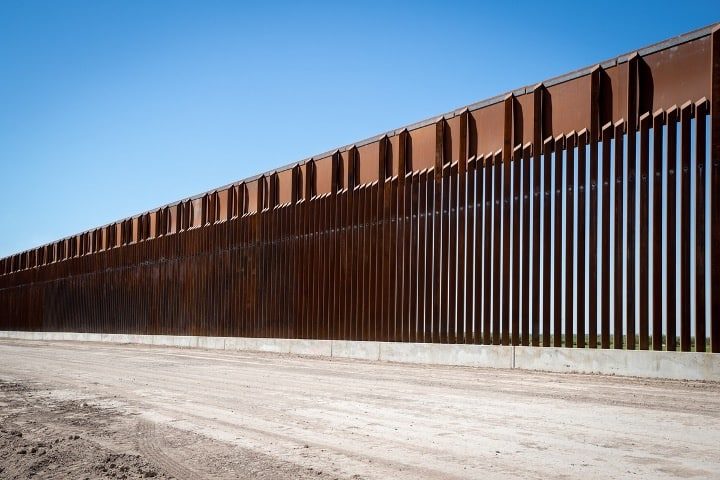
The courts continue to play a pivotal role in shaping immigration policy in America.
On Thursday, the U.S. Supreme Court, in an 8-1 decision, ruled that states do not have the authority to challenge the administration’s rules establishing migration deportation priorities.
The case arose from a suit by the states of Texas and Louisiana against the Department of Homeland Security for issuing guidelines that prioritize the deportation of migrants who have committed violent crimes.
The states argue that this policy creates a lax enforcement environment that is causing states to be overwhelmed by migrants, who are exhausting health care, education, and social services.
Homeland Security Secretary Alejandro Mayorkas praised the Supreme Court for handing the Biden administration a win.
“We applaud the Supreme Court’s ruling. DHS looks forward to reinstituting these Guidelines, which had been effectively applied by U.S. Immigration and Customs Enforcement (ICE) officers to focus limited resources and enforcement actions on those who pose a threat to our national security, public safety, and border security. The Guidelines enable DHS to most effectively accomplish its law enforcement mission with the authorities and resources provided by Congress,” Mayorkas said.
Justice Brett Kavanaugh wrote the court’s majority opinion, which was joined by Chief Justice John Roberts and the court’s three liberal justices.
“If the Court green-lighted this suit, we could anticipate complaints in future years about alleged Executive Branch under-enforcement of any similarly worded laws—whether they be drug laws, gun laws, obstruction of justice laws, or the like,” Kavanaugh wrote, going on to argue that while the states wanted to oblige the federal government to make more arrests, the Supreme Court had “long held ‘that a citizen lacks standing to contest the policies of the prosecuting authority when he himself is neither prosecuted nor threatened with prosecution.’”
The lower courts had sided with Louisiana and Texas, acknowledging that they had suffered undue costs because of the federal government’s enforcement priorities.
Justice Samuel Alito authored the dissenting opinion, writing:
The District Court’s factual findings, which must be accepted unless clearly erroneous, quantified the cost of criminal supervision of aliens who should have been held in DHS custody and also identified other burdens that Texas had borne and would continue to bear going forward.
These findings sufficed to establish a concrete injury that was specific to Texas.
Meanwhile, justices Neil Gorsuch, Clarence Thomas, and Amy Coney-Barrett issued concurring opinions, one authored by Gorsuch in which he was joined by Thomas and Barrett, and another authored by Barrett in which she was joined by Gorsuch.
In both these concurring opinions, while the justices obviously agreed with the majority decision, they took issue with the majority’s legal reasoning as articulated by Kavanaugh.
Gorsuch wrote that the states successfully proved that the administration’s policies burdened them with increased costs, but said the remedy prescribed by the lower courts would not be a viable solution.
He argued that Texas and Louisiana face a redressability problem, meaning that even a favorable ruling would not remedy the injuries incurred by them from the federal government.
On Friday, the Supreme Court issued another ruling involving migration, this one giving a victory to immigration hawks. In a 7-2 decision, the court sided with the Justice Department against a lower court that had held that it was unconstitutional for it to be a crime to encourage illegal immigration.
The lower court had ruled that the law violates the First Amendment right to free speech. But in the majority opinion, Barrett clarified that the law does not ban speech, but the actual facilitation of illegal migration.
“Properly interpreted, this provision forbids only the intentional solicitation or facilitation of certain unlawful acts,” Barrett wrote.
The two dissenters were liberal justices Ketanji Brown Jackson and Sonia Sotomayor. Jackson authored the dissenting opinion.
The case involved one Helaman Hansen, who was convicted for a scheme in which he falsely promised approximately 471 noncitizens American citizenship through adult adoption. Through this scheme, Hansen raked in $1.8 million.
Hansen appealed by arguing the crime was constitutionally too broad, overriding protected speech. As The Hill notes, “in free speech cases, such as Hansen’s, defendants have the ability to challenge laws on their face, even if their own speech at issue was unprotected, out of concern that others’ speech may still be unconstitutionally chilled.”
The case was the second time the high court looked at the issue of encouraging illegal migration.
In the dissenting opinion, Justice Jackson wrote that “by acquiescing to the Government’s newly minted pitch to narrow this statute in order to save it, the majority undermines the goal of the overbreadth doctrine, which aims to keep overly broad statutes off the books in order to avoid chilling constitutionally protected speech.”
Justice Thomas, however, wrote that he opposes the overbreadth doctrine and would like to see the court reconsider it in “an appropriate case,” arguing that “this case demonstrates just how far courts have drifted from their original station of adjudicating the rights of the parties before them in accordance with law.”
To learn more about the immigration crisis and what can be done about it, click here.




